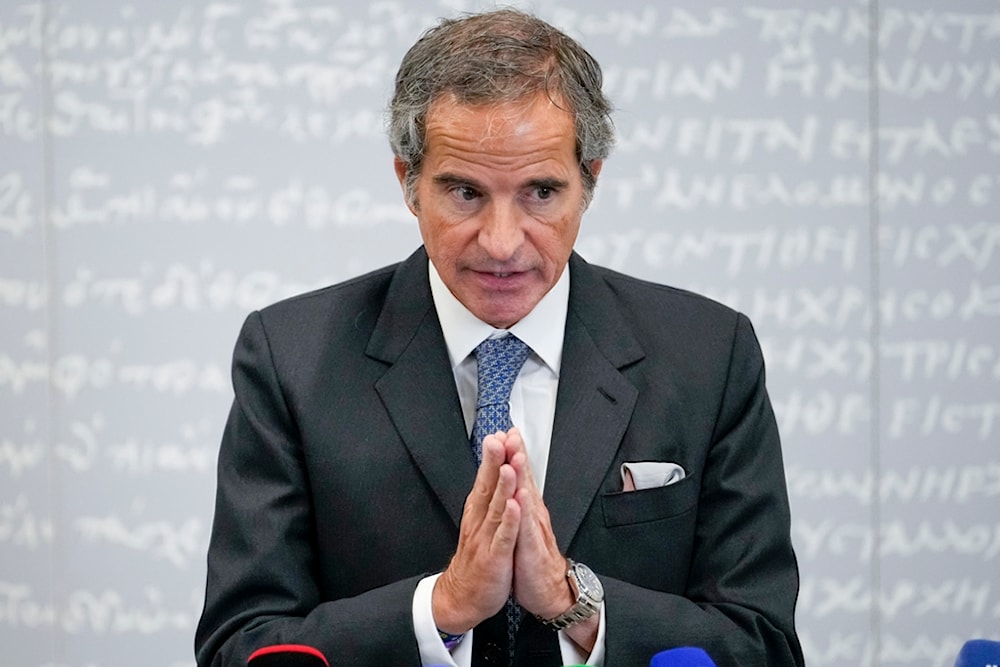IAEA could hold talks with Iran amid Trump deadline: Report
The International Atomic Energy Agency is hinting that it may hold talks with Iran as US President Donald Trump's deadline nears.
-

International Atomic Energy Agency Director General Rafael Mariano Grossi gestures while speaking to the media after their talks in Moscow, Russia, Friday, February 7, 2025 (AP)
The International Atomic Energy Agency (IAEA) has indicated the possibility of renewed discussions with Iran after recent talks with a senior Iranian official failed to produce a breakthrough in the agency’s long-running nuclear investigation.
The stalled negotiations highlight the urgent need for a diplomatic resolution to the tense standoff between Iran and the United States.
IAEA Director General Rafael Mariano Grossi stated on Tuesday that he may soon return to Tehran for further discussions with Iranian representatives. "We are at a very important juncture," he told Bloomberg television in an interview.
Grossi also referenced an outreach effort by former US President Donald Trump, noting that Trump had sent a letter to Iran’s Supreme Leader, Ayatollah Sayyed Ali Khamenei.
"It is clear that we need to have some form of understanding that would completely preclude the possibility of Iran getting a nuclear weapon," he said.
2-month deadline
Trump's letter reportedly set a two-month deadline for Iran to agree to a new nuclear deal or face potential military action.
In response, Iran announced last week that it was evaluating the letter and warned the US against any aggressive actions, cautioning that Washington would face severe consequences.
As part of ongoing diplomatic efforts, Iranian Deputy Foreign Minister Kazem Gharibabadi recently visited IAEA headquarters, where he met with Chinese and Russian diplomats.
In a joint statement, the three nations emphasized the need to address the root causes of the crisis while rejecting sanctions, pressure, or the use of force.
Resurging tensions
Tensions over Iran’s nuclear program have remained high since the US withdrew from the 2015 nuclear deal in May 2018, reimposing sanctions that prompted Iran to increase its uranium enrichment.
The IAEA continues to monitor Iran’s activities, with an upcoming report expected to detail unresolved infractions and the presence of uranium particles detected at undeclared sites.
"We are not where we would like to be," Grossi acknowledged. "Now these things come together: on the one hand, these unresolved questions from the past; then at the same time, the possibility of having some viable agreement for the future."
Iran open to talks
Iran signaled on Monday that it is open to indirect negotiations with the United States, but will not be pressured into talks.
"The way is open for indirect negotiations," Iranian Foreign Minister Abbas Araghchi said, but dismissed the possibility of direct talks "until there is a change in the other side's approach towards the Islamic Republic."
Araghchi reiterated that Tehran would not engage in direct discussions with Washington while facing threats as long as Trump maintains his "maximum pressure" policy. That policy, which Trump enacted during his first term, saw the US withdraw from the 2015 nuclear deal and reimpose harsh sanctions on Iran.
Araghchi, on Sunday, affirmed that Iran makes decisions based on its interests, regardless of Trump's expectations, in an interview addressing the Republic's receipt of a letter from the US President.

 4 Min Read
4 Min Read








